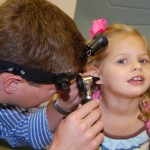 Children often have problems with ear infections. In fact, in many instances it seems as though it is a right of passage in those early childhood years. Overall, acute otitis media (AOM, aka ear infection) is the most common reason a parent takes the child to the doctor in the U.S. Roughly 80% of all children have an episode of AOM by the age of 2 years. However, this does not become a recurrent problem in most children, and only a small group of children require ear tube placement. The following information is based on the many questions I am asked regarding ear tubes.
Children often have problems with ear infections. In fact, in many instances it seems as though it is a right of passage in those early childhood years. Overall, acute otitis media (AOM, aka ear infection) is the most common reason a parent takes the child to the doctor in the U.S. Roughly 80% of all children have an episode of AOM by the age of 2 years. However, this does not become a recurrent problem in most children, and only a small group of children require ear tube placement. The following information is based on the many questions I am asked regarding ear tubes.
Do adults ever need ear tubes? Yes, but much less common than children. Some adults will have Eustachian tube problems and develop fluid behind the eardrum that causes a mild to moderate hearing loss. If medications do not resolve the fluid, then an ear tube can be placed to correct the problem.
How are ear tubes placed? In children, they are placed in the Operating Room. The child will have general anesthesia, inhaled gas only (no I.V. medications) for roughly 5-10 minutes total. Using a microscope and a small scapel, an incision is made through the eardrum and, if present, fluid and infection is removed with a suction and the ear tube placed. Afterwards, the child will be drowsy until the anesthetic gas wears off (usually within 4-6 hours). Most adult patients comfortably allow the procedure done in the clinic, using a topical anesthetic to numb the eardrum for tube placement.
When should ear tube placement be considered? The American Academy of Otolaryngology: Head and Neck Surgery recommends ear tube placement if there are 3 infections within 6 months or 4 infections within one year. If the infection is cleared but fluid persists (past 3 months) causing hearing loss, then ear tubes can be placed to drain the fluid and improve the hearing loss.
Are ear tubes permanent? No. Standard ear tubes typically stay in for 6-18 months. Larger tubes can stay in longer, but are only used for patients that require multiple sets of ear tubes. Rarely do they not fall out on their own and require removal.
Can my child swim with ear tubes? Yes and No. Chlorinated swimming pools have been studied and show no significant risk of developing an ear infection. However, all other water (lakes, oceans, baths, etc) is considered dirty and may cuase the devleopment of an ear infection. To prevent this, the patient may wear ear plugs that are sold in most pharmacies. For children that have trouble with the generic ear plugs, our Audiologists can make fitted plugs that work well for most patients.
Can my child develop an ear infection despite having ear tubes? Yes. In fact, most patient will have an episode even with the ear tubes. An ear infection with a functioning ear tube does not cause pain, only ear drainage. If this happens, only antibiotic ear drops (and not systemic oral antibiotics) are usually needed to clear the infection. Rarely, the infection and drainage will not clear and the tubes may need removed-replaced.
What complications are there with ear tubes? There is a 1-2% risk of a hole being left in the eardrum, known as a Tympanic membrane perforation that may need repaired in the future. Scarring, or sclerosis, of the eardrum is common but is not associated with any hearing loss. General anesthesia (inhaled gas only) is required for children and there is a very small risk of a reaction to the medication.
My child talks loudly and I am concerned of hearing loss, could there be an ear infection? Unlikley this is from an infection, but it could be due to persistant fluid build-up behind the ear drum that is causing hearing loss. A standard hearing test can help make this diagnosis. The good news is that this is typically treated with medication or an ear tube, and no permamnent hearing loss is noted.
If you have any other questions, then feel free to contact me directly.
Robert Wilson, MD.
